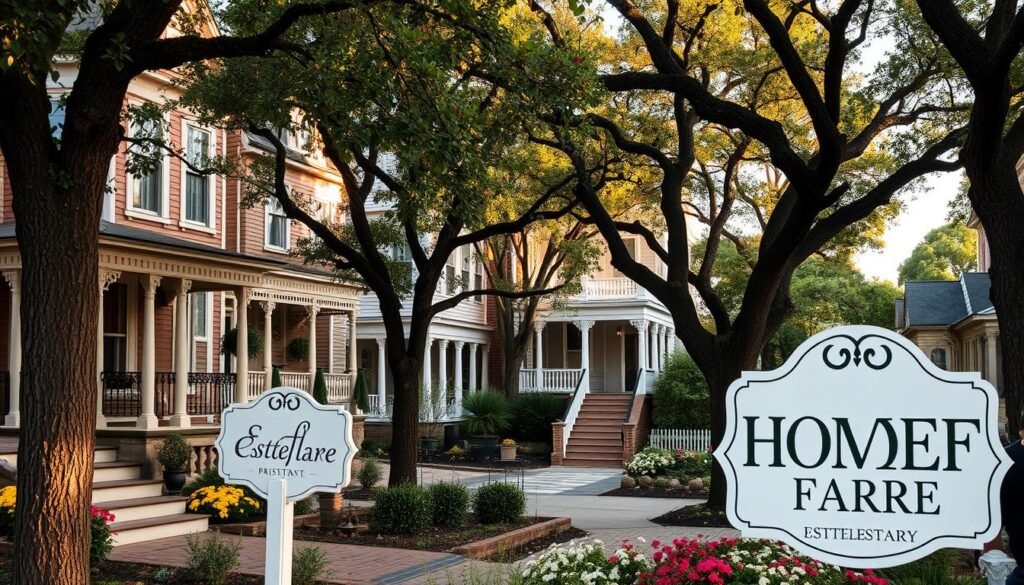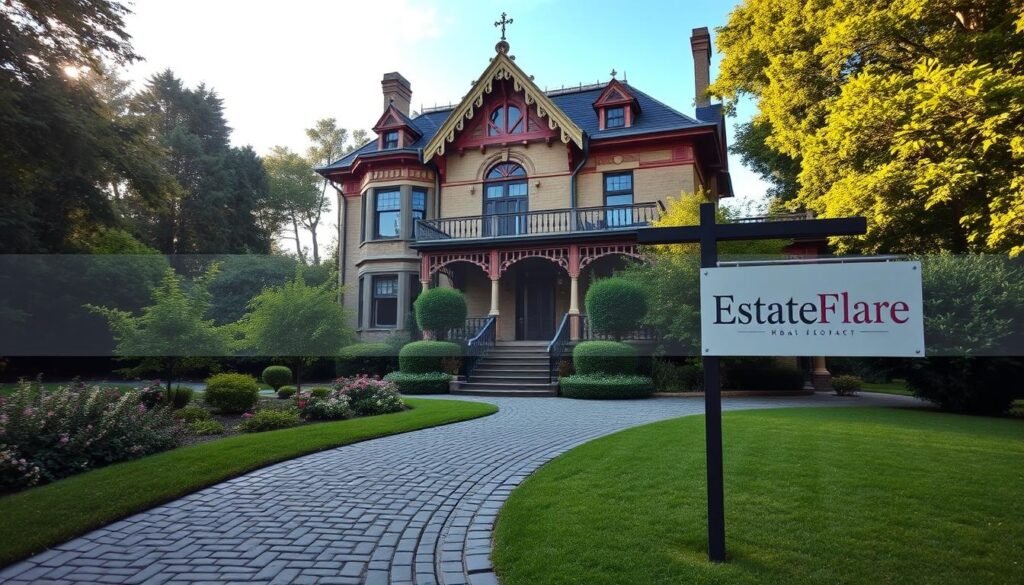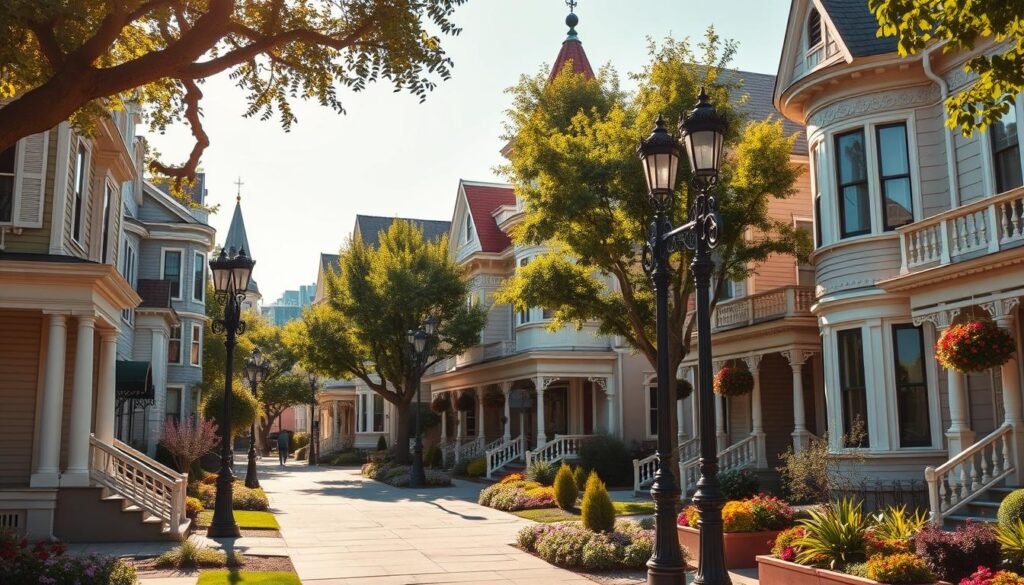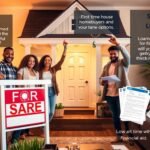Did you know that over 15% of the U.S. real estate market is historic properties? Buying historic properties offers a unique living experience and potential for value growth. This guide will help you understand the process, including designations, financing, and preserving the original architecture.
Key Takeaways
- Historic properties offer a unique living experience and potential for long-term value appreciation.
- Understanding historic property designations, such as the National Register of Historic Places, is crucial when buying a historic home.
- Researching historic properties for sale through online resources and local real estate agents can help you find the perfect investment.
- Navigating the buying process with the guidance of preservation organizations can ensure a smooth transaction.
- Securing financing options tailored to historic home buyers can make the purchase more accessible.
The Allure of Owning a Piece of History
Walking into a historic home feels like stepping back in time. The walls tell stories of the past, and the architecture shows a rich cultural heritage. For those who love legacy property ownership, owning a piece of history is very appealing. These homes let you preserve architectural heritage and feel a deep sense of fulfillment.
Whether it’s the detailed work of antique home restoration or the grand beauty of historic landmarks, owning a piece of the past is special. Homeowners who choose this path live in a world filled with timeless charm. They are surrounded by the echoes of those who lived before them.
Restoring and keeping these historic homes is a labor of love. It shows the enduring spirit of the structures that have stood the test of time. Owning a historic home is not just about the house. It’s about preserving history for future generations.
| Benefits of Owning a Historic Property | Challenges of Owning a Historic Property |
|---|---|
|
|
Owning a historic property is more than just buying a house. It’s a commitment to keep the past alive and shape the future. For those who love legacy property ownership, the rewards are deep and meaningful. They touch the heart and soul of those who live in a piece of history.
“Restoring a historic home is not just about preserving the past; it’s about honoring the stories that have been etched into the walls and breathing new life into a cherished legacy.”
Understanding Historic Property Designations
Exploring historic properties means knowing about different designations and rules. We’ll look at the National Register of Historic Places and local historic districts. These classifications affect buying and maintaining these unique homes.
National Register of Historic Places
The National Register of Historic Places lists the nation’s historic sites. It includes homes, businesses, and public buildings, as well as historic areas. Being on this list offers protections and benefits, like tax credits and grants for historic district real estate updates.
Local Historic Districts
Local historic districts are also important. They are set by cities or counties. These areas have their own rules for vintage estate acquisitions and property renovation. Knowing these rules is key for those interested in historic district real estate.
| Designation | Key Characteristics | Buyer Considerations |
|---|---|---|
| National Register of Historic Places | – Official federal list of historic places – Provides access to tax credits and grants – Protects against federal projects that could harm historic sites |
– Eligibility for rehabilitation tax credits – Potential access to preservation grants – Additional review process for modifications |
| Local Historic Districts | – Designated and regulated by local governments – Often have stricter guidelines for exterior changes – May require approval for demolition or major renovations |
– Compliance with local historic preservation codes – Approval process for exterior modifications – Potential impact on property renovation plans |

Knowing about historic property designations is vital for buyers. By understanding the National Register and local historic districts, buyers can make better choices. This knowledge helps them confidently navigate the vintage estate acquisitions process.
Buying Historic Properties: Expert Guide & Tips
Buying a historic property needs a special approach and deep knowledge. As historic home buyers and real estate investors, we’ve gathered insights from experts. This guide will help you buy a piece of history.
First, research the property’s designation and any rules or restrictions. Properties on the National Register or in historic districts have special renovation and preservation rules.
After finding a property you like, work with a real estate agent who knows buying historic properties. They can help with the unique challenges and benefits of owning a historic home.
- Evaluate the property’s condition and its potential for restoration or renovation.
- Understand the financial side, including tax credits or incentives for historic home owners.
- Work with preservation groups to follow historic guidelines.
- Find the right financing, like specialty loans or grants for historic preservation.
By following this guide, you’ll be ready to invest in a historic property. You’ll help preserve the architectural heritage that makes these homes unique and captivating.
Researching Historic Properties for Sale
Finding historic properties for sale is exciting but needs special knowledge. We’re experts in historic district real estate. We’ll help you find these gems and find the right vintage estate acquisitions.
Online Resources
The internet has changed how we look for historic properties. There are many websites and online groups to explore. Here are some top places to start:
- Specialized historic property listings websites
- Real estate portals with historic district search filters
- Online forums and discussion groups focused on property renovation and historic preservation
Local Real Estate Agents
Online tools are great, but local agents are unbeatable. They know the unique challenges and chances of property renovation and vintage estate acquisitions. They offer valuable advice, connect you with resources, and guide you through buying a historic property.
| Feature | Online Resources | Local Real Estate Agents |
|---|---|---|
| Specialized Listings | ✓ | ✓ |
| Local Market Expertise | – | ✓ |
| Personalized Guidance | – | ✓ |
| Historic Preservation Knowledge | – | ✓ |
Using online resources and local agents, you can find the perfect historic property. Start preserving history today.

Navigating the Buying Process
Buying a historic property means working together with preservation groups and government agencies. This teamwork is key to follow rules and keep the building’s original look. We’ll look at the steps to buy a historic property successfully.
Working with Preservation Organizations
It’s important to team up with local preservation groups when buying a historic home. They offer great advice and help during the buying process. They guide you through rules, help get permits, and make sure your fixes match the property’s history.
- Find local preservation groups and historic societies near the property you want.
- Get in touch with them early to learn what they need and follow their rules.
- Work with them to plan renovations that keep the property’s historic feel.
- Use their knowledge to get through the approval process and get the right permits.
By teaming up with preservation groups, historic home buyers can make a smooth and successful purchase. This teamwork helps keep the property’s unique charm and history alive.
Financing Options for Historic Home Buyers
Buying a historic property is rewarding but comes with financial challenges. Luckily, there are loan programs and funding sources for historic home buyers. We’ll look at these options to help you invest wisely.
Preservation-Focused Mortgages
Preservation-focused mortgages are a key option for historic home buyers. Loans like the FHA’s 203(k) program help with buying and fixing up historic homes. These programs give buyers the funds to keep their legacy property in top shape.
Tax Incentives and Credits
Historic property owners can get tax breaks and credits. The Historic Rehabilitation Tax Credit offers a 20% credit on rehab costs for income-generating historic homes. States and local governments also offer tax breaks to help preserve these historic home buyers.
| Financing Option | Description | Key Benefits |
|---|---|---|
| Preservation-Focused Mortgages | Specialized loans designed to cover the costs of purchasing and rehabilitating historic properties | Allows for the restoration and maintenance of architectural integrity |
| Tax Incentives and Credits | Federal, state, and local incentives to encourage the preservation of historic properties | Helps offset the costs of owning and maintaining a legacy property |
Understanding and using these financing options can make your real estate investing journey successful. It also helps preserve your property’s architectural heritage.

Preserving Architectural Heritage
Owning a historic property is a big responsibility. It means we must carefully choose between restoration and renovation. We aim to keep the building’s original charm while making it suitable for today’s life.
Restoration vs. Renovation
Restoration and renovation have different meanings for historic homes. Restoration aims to bring the building back to its original state. It uses materials and methods from the past. Renovation, however, updates the property while keeping its historic look.
Choosing between restoration and renovation depends on the property’s state, the owner’s wishes, and local rules. Sometimes, a mix of both is the best way to merge old and new.
Maintaining Historic Integrity
Keeping a property’s historic integrity is key. It respects the building’s history and keeps its value. This includes:
- Carefully restoring original features, such as doors, windows, and moldings
- Using materials and finishes from the past
- Getting advice from local preservation groups
- Following zoning and landmark rules
By focusing on preserving architectural heritage, we help these historic landmarks inspire future generations.
| Restoration | Renovation |
|---|---|
| Focuses on returning the structure to its original condition | Involves updating and modernizing the property while respecting its historic character |
| Uses materials and techniques that are historically accurate | Blends the old and the new seamlessly |
| Preserves the historic integrity of the building | Enhances the livability of the property |
“The true meaning of life is to plant trees, under whose shade you do not expect to sit.”
– Nelson Henderson
Living in a Historic Property
Owning a legacy property, like a historic landmark or a vintage estate, is special. It brings unique joys and challenges. We’ll look at the good and bad of owning such a property, from its charm to everyday upkeep.
Living in a historic property lets you dive into the past. Every corner tells a story, from the moldings to the creaky floors. It’s a humbling and inspiring experience, making you a guardian of history.
But, there are also hurdles. Keeping the home’s original look and following preservation rules can be tough. You’ll need to know a lot and spend time and money. It’s a big job, but it’s worth it.
Despite the hard parts, the benefits are huge. You’ll feel connected to history, help preserve buildings, and feel proud of your role. By loving your home’s past, you’ll leave a lasting legacy for others to enjoy.

Real Estate Investing in Historic Districts
Investing in historic district real estate can be a smart move. It offers unique benefits and growing popularity. Real estate investing in historic districts can lead to higher property values and the preservation of architectural heritage.
One big plus is the chance for property value to increase. Historic homes and buildings are highly valued. As demand grows, investors can see big returns. Plus, historic districts often offer tax breaks and other financial perks.
However, real estate investing in historic districts has its own set of challenges. You need to know local rules, handle renovations carefully, and keep the property’s historic look. Team up with preservation groups and real estate pros to overcome these hurdles and boost your investment’s value.
Whether you plan to flip or hold onto a historic property, the historic district real estate market is worth exploring. It offers a chance to make money and help save our cultural and architectural heritage. By investing in these areas, you secure your financial future and preserve history.
| Key Considerations for Real Estate Investing in Historic Districts | Potential Benefits |
|---|---|
|
|
“Investing in historic district real estate is not just about financial returns – it’s about preserving the stories and character of our communities for generations to come.”
Legal Considerations and Zoning Regulations
Buying a historic property means dealing with many legal rules and zoning laws. If you want to own a vintage estate or a property in a historic area, you need to know the details. This ensures a smooth and legal process.
Preservation easements are a big deal. These agreements limit what you can do with the property to keep its history and design safe. Before buying, check if there are any easements. Talk to local groups to understand what you can and can’t do with your property.
Historic areas also have strict rules for building and design. These rules cover things like what materials you can use and the colors you can paint your house. Breaking these rules can lead to fines or delays in getting the right permits.
| Key Legal Considerations | Zoning Regulations to Understand |
|---|---|
|
|
Knowing the legal rules and zoning laws helps buyers of historic properties. It ensures they can own and renovate their property legally. This way, they can keep the history and culture of these special places alive.

“Owning a historic property is not just about acquiring a piece of the past – it’s about preserving and honoring the enduring legacy that it represents.”
The Rewards of Owning a Legacy Property
Being the caretaker of a historic property is very rewarding. It lets you help keep architectural heritage alive and leave a lasting mark. When you buy a legacy property, you’re not just getting a home. You’re also protecting a piece of history for future generations.
One big benefit of owning a historic landmark property is the personal satisfaction. You’re helping keep your community’s historic legacy alive. This not only helps your neighborhood but also helps preserve our nation’s history.
There are also financial perks to legacy property ownership. These properties often increase in value, making them a good investment. Plus, many places offer tax breaks and grants for keeping these homes historic, adding to their financial appeal.
“Owning a historic property is like holding a piece of the past in your hands. It’s a responsibility, but also a privilege – one that allows you to make a lasting impact on your community and leave a meaningful legacy for future generations.”
Whether you love the charm of a Victorian or the elegance of a mid-century modern, legacy property ownership is special. It lets you dive into your local community’s rich history. By investing in this way, you become a guardian of the past, shaping the future and leaving a lasting impact on your surroundings.
| Personal Rewards | Cultural Rewards | Financial Rewards |
|---|---|---|
| Sense of fulfillment | Preserving architectural heritage | Property appreciation |
| Stewardship of history | Contributing to community identity | Tax incentives and preservation grants |
| Leaving a meaningful legacy | Safeguarding national architectural legacy | Sound investment opportunity |
REAL ESTATE MARKET ANALYSIS: EXPERT INSIGHTS & TOOLS
Conclusion
Buying historic properties is a unique and rewarding journey. It involves understanding the designations, navigating the buying process, and preserving architectural heritage. This way, we become guardians of the past.
Whether you’re new to historic homes or an experienced investor, success comes from research, smart financing, and a love for these properties’ stories. By investing in historic homes, we keep our architectural legacy alive. We also enrich our communities.
We urge you to take on the challenge of buying a historic property. With the right approach, resources, and commitment to preservation, you can bring out the best in these timeless treasures. Their stories will continue to inspire and captivate future generations.



